The guinea pigs are the most sociable house pets out there. They’re also vegetarian. We as their owners must plan out their nutrition. It is simple to organize a vegetarian menu, but there are some veggies and fruits that need more research before you feed the cavy. For example, the bean sprouts.
Can guinea pigs eat bean sprouts? Guinea pigs can eat bean sprouts. However, even though the guinea pigs can eat it, this is one of the foods they dislike. The bean sprouts have a distinct taste, smell, and aroma, so even if the cavy eats them, it may not be completely satisfied. Although bean sprouts are not the primary food for cavies, they do have some benefits.
Bean sprouts are a very popular food in the Asian region. Also, the sprouts appear to be veggie noodles at first glance, which makes them easy for the cavies to chew.
However, they have a very specific aroma and this can sometimes be unpleasant for guinea pigs. Still, is this food healthy for cavies? Why are most cavies not crazy about them? Let’s have a detailed look.
Table of Content
Are Bean Sprouts Good for Guinea Pigs? | Health Benefits
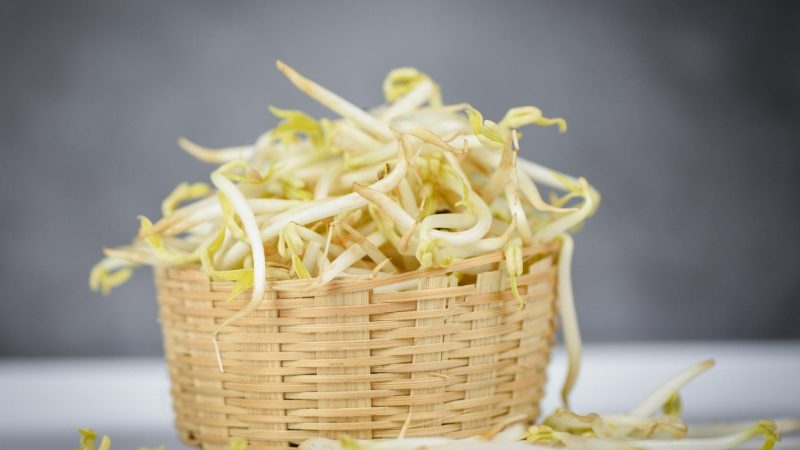
Bean sprouts have carbs and proteins. This gives the cavy enough energy during the day. It contains almost no fat, and this keeps blood vessels and the cardiovascular system healthy.
If given in moderation, the bean sprouts will work up digestion well. All bean-like foods have fibers that improve digestion instantly.
Bean sprouts have vitamin C, and this is the most essential vitamin for cavies. The guinea pigs cannot make this vitamin naturally. Also, they cannot store this vitamin in their bodies, so supplements or foods with vitamin C are a must. If your cavy gets the needed vitamin C, it won’t develop scurvy (rough coat, stiff joints, fatigue, no appetite, nose/eyes discharge).
Also, there are many good minerals in bean sprouts. The leaf part has vitamin C and K, and other minerals that can stop the calcium buildup. This is good because too much calcium can create bladder and kidney stones for the cavy.
Other benefits of bean sprouts are good eyesight, prevention of heart problems, and healthier bones. However, even with all these benefits, the bean sprouts must be given rarely because they come with risks at the same time.
Nutrition Facts of Bean Sprouts
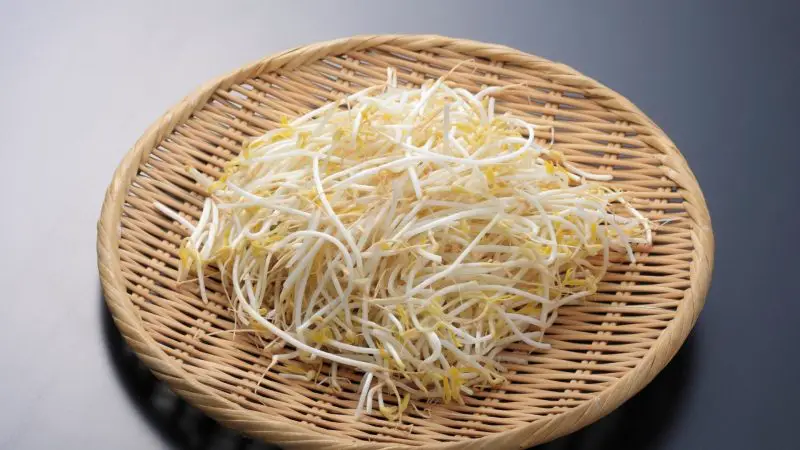
The bean sprouts are literally sprouts of beans. Usually, any bean can be used for this, but the most commonly used are mung beans and soybeans. Sprouts as a type of food are rich in fibers and they have almost no fats. For guinea pigs, they are good for overall health but let’s see the nutrition values of bean sprouts in detail.
For a serving of 3 oz (100 g) of bean sprouts, there is:
- 31 calories
- Carbs – 2 g
- Protein – 2 g
- Fat – 2 g
- Fiber – 9 g
- Vitamin C – 23%
- Vitamin K – 43%
- Folate – 16%
- Manganese – 10%
- Copper – 9%
- Riboflavin – 8%
- Phosphorus – 6%
- Vitamin B6 – 5%
- Iron – 5%
- Magnesium – 5%
- Niacin – 4%
- Potassium – 4%
Are Bean Sprouts Bad for Guinea Pigs? | Possible Risks
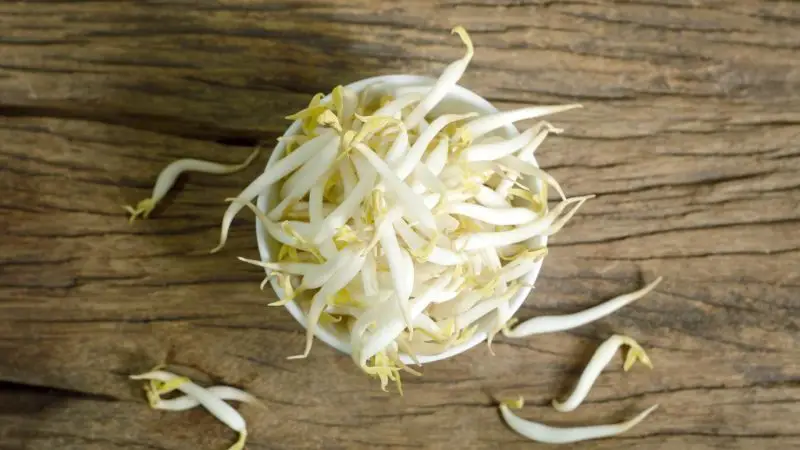
Bean sprouts are relatively easy to digest and can be beneficial to digestion if consumed in moderation. One risk of too much bean sprouts could be imbalanced digestion or imbalanced digestive health. The cavy might be a bit bloated or have gas buildup.
Another risk of bean sprouts is the possible risk of foodborne illnesses. Rodents, especially guinea pigs, are prone to getting or carrying some illnesses that can be transmitted to humans.
If some fresh produce is cooked lightly or if it’s eaten raw, it can carry some foodborne illness. This goes even for bean sprouts.
Beans and seeds require a very warm and very humid environment. This way, they grow and sprout. But, such a warm and humid environment is also perfect for growing bacteria, such as E.coli, listeria, and even salmonella.
For humans, it’s always best to cook bean sprouts before eating. This goes mostly for kids, people with weak immunity, and pregnant women. However, be careful with the cavy because these foods can expose it to the risk of such illnesses.
Your cavy can try both raw and cooked bean sprouts. What matters is the small size serving, once a week.
The bean sprouts have phosphorus and this is not very good for cavies. The phosphorus which works together with calcium is closely linked to most urinary problems in guinea pigs.
Healthy kidneys must always have a balance between calcium and phosphorus. Foods with lots of calcium or phosphorus will probably make bladder and kidney stones in cavies.
Serving and Frequency of Bean Sprouts for Guinea Pigs
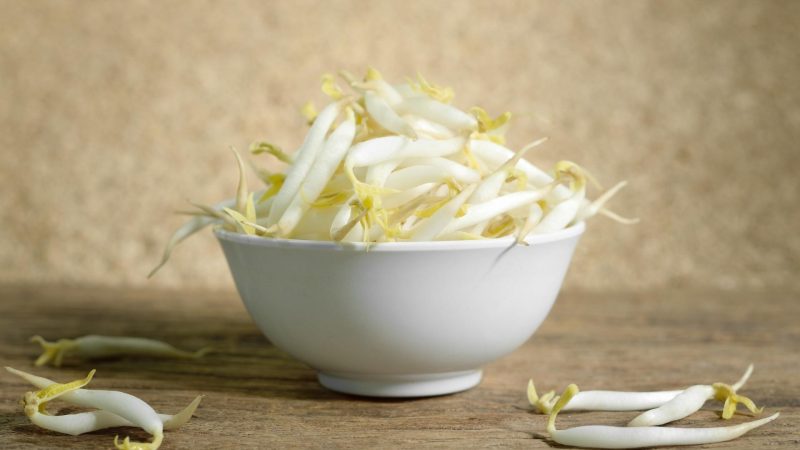
There are plenty of nutrients in the bean sprouts. You can give the cavy some bean sprouts 1-2 times per week. A good serving can be less than a handful, or several sprouts.
If this is a new food for the cavy, introduce it slowly and make sure the sprouts don’t smell too much. Introduce this as plain food.
If you mix it with something else, the cavy might not be too happy about it. After all, this is a new food for them and must be tried separately.
More Information About Guinea Pigs and Bean Sprouts
Can Guinea Pigs Eat Cooked Bean Sprouts?
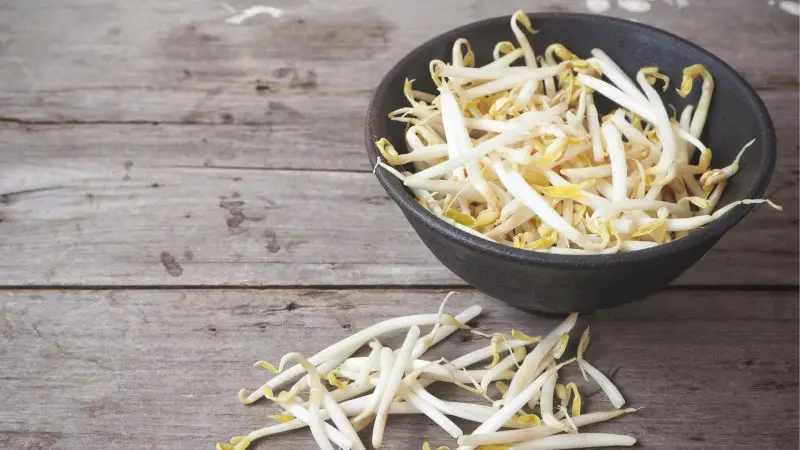
Guinea pigs cannot consume cooked food and must be given raw food. The majority of individuals who are unfamiliar with them believe they can give them prepared food.
You are not supposed to feed them any cooked food, regardless of what sort of food they prefer or like. Cooked food is indigestible to guinea pigs, causing stomach distress and maybe diarrhea.
Raw bean sprouts are high in Vitamin C and Vitamin K, both of which are essential for the health of your guinea pig. Also, keep in mind that when food is cooked, Vitamin C degrades. As a result, we should not provide cooked food to our guinea pigs.
Can Guinea Pigs Eat Mung Bean Sprouts?
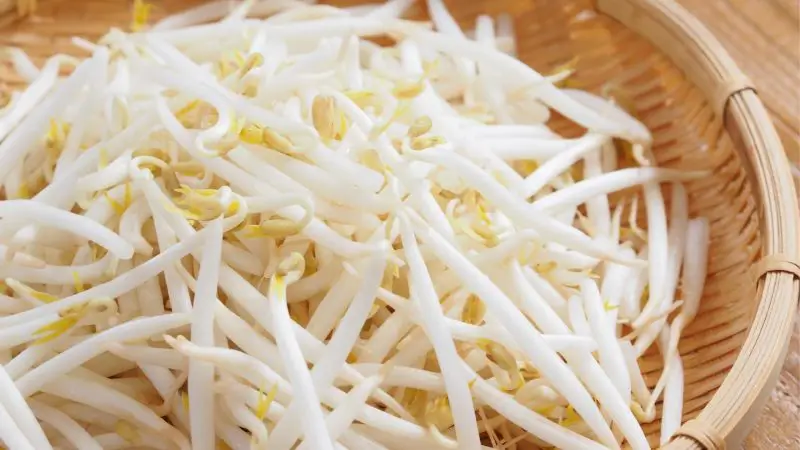
Mung bean sprouts are a common element in a variety of recipes. They’re utilized since they’re high in nutrients. When you compare this to the nutritional needs of guinea pigs, you can see that they can eat it.
Because of the acidic content, this should only be done once or twice a week for your pet.
Quick Facts on Bean Sprouts and Guinea Pigs
- Guinea pigs can eat bean sprouts, but it’s not the best food choice.
- The taste is very unique. The cavies either like it or hate it.
- Bean sprouts are not the main food item for guinea pigs. They are given very rarely.
- The typical serving frequency is once per week, with a maximum of twice per week.
- A normal serving is a few bean sprouts or less than a handful.
- Sprouts are made in a warm and humid environment.
- They contain carbohydrates, proteins, and no fat.
- Bean sprouts also contain vitamin C, the most important vitamin for a cavy’s health.
- The stem part has manganese and vitamin K.
- The upper stem part has vitamin C, K, and minerals.
- A small amount of sprouts is good for digestion.
- Excess amount of bean sprout can cause gasses, bloating and slower digestion.
We have also made a full list of foods that guinea pigs can and can’t eat (150+ Types of Foods). Be sure to also check our recommended products page for everything you will ever need to assure a happy life for your guinea pigs. Hope this information was helpful and you have found the answer you were looking for.
List of Sources
Vitamin C Requirements of the Guinea-Pig

